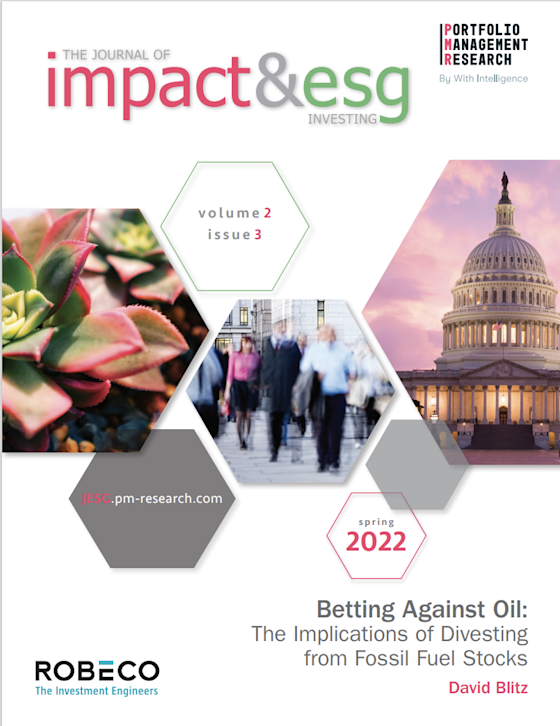

The implications of divesting from fossil fuel stocks
Excluding fossil fuel companies from a portfolio comes down to an active bet against the oil price. This exposes the portfolio to significant risk of under performance in the short and medium term.
Summary
- Several major asset owners are divesting from fossil fuel stocks
- This amounts to an active bet against oil, given the lack of a suitable hedge
- It carries the risk of prolonged underperformance during energy and oil rallies
In recent years, the growing sense of urgency about climate change has intensified the drive to tackle the issue and mitigate its effects. To this end, the financial industry is seen as having a critical role to play in enabling decarbonization. Against this backdrop, several large institutional investors have either divested from fossil fuel stocks or announced their intention to do so.1 That said, it is worth being cognizant of the portfolio implications of precluding investments in such companies.
In recent years, the growing sense of urgency about climate change has intensified the drive to tackle the issue and mitigate its effects. To this end, the financial industry is seen as having a critical role to play in enabling decarbonization. Against this backdrop, several large institutional investors have either divested from fossil fuel stocks or announced their intention to do so.1 That said, it is worth being cognizant of the portfolio implications of precluding investments in such companies.
In our research,2 we examined the effect that the exclusion of fossil fuel stocks has on the systematic risk exposure of equity portfolios. We focused on macroeconomic risk factors that explain large differences in short and medium-term returns. Our sample period spanned from January 1995 to December 2021. Given that fossil fuel divestments tend to focus on oil and gas companies, we used the energy industry as a proxy for our study. Figure 1 shows that the sector exhibits an exceptionally high beta towards changes in oil prices, i.e. fossil fuel prices.
Figure 1 | Estimated oil betas of global sector indices, January 1995 to December 2021

Robeco Quantitative Research, Refinitiv Datastream. The chart uses monthly USD returns for the MSCI World Index and the 11 GICS level 1 sectors, as well as monthly oil price data for the period January 1995 to December 2021.
To get a better feel for the economic relevance of the oil exposure of the energy sector, we examined how it performed during oil bull and bear markets. We saw that the bull and bear scenarios accounted for 61% and 39% of the sample period, respectively. As depicted in Figure 2, the energy industry strongly outperformed during oil bull markets and severely underperformed during oil bear markets, in line with its high oil beta.
Figure 2 | Sector performance relative to market during oil bull regimes versus bear regimes, January 1995 to December 2021

Robeco Quantitative Research, Refinitiv Datastream. The chart uses monthly USD returns for the MSCI World Index and the 11 GICS level 1 sectors, as well as monthly oil price data for the period January 1995 to December 2021.
Surprisingly, the materials sector delivered a similar pattern of returns, despite having a much smaller oil beta. This result suggests that it could serve as a good substitute for the energy sector. However, it is doubtful whether it qualifies as an acceptable alternative for investors who wish to divest from fossil fuel stocks, because, like energy, the materials sector has high carbon emissions and a range of environmental issues.
The next best hedge appeared to be the industrials segment, but the sector generated significantly less pronounced returns during oil bull and bear regimes. Moreover, it also contains many firms with high carbon footprints, such as airplane manufacturers and airline companies. The remaining industries exhibited the opposite sensitivity to oil price changes, i.e. they underperformed during oil bull markets and outperformed during oil bear markets.
Aside from the equity market, oil futures present another hedging option. By systematically going long oil futures, positive returns are achieved during oil bull phases and negative returns during oil bear regimes, similar to the market-relative performance of the energy sector. However, if the purpose of excluding energy stocks is to divest from fossil fuels, then oil futures are unlikely to be considered as an acceptable solution.
Therefore, divesting from fossil fuel stocks entails actively betting against oil, as it seems as if this risk cannot be hedged without taking on other (implicit or explicit) forms of fossil fuel exposure.
Keep up with the latest sustainable insights
Join our newsletter to explore the trends shaping SI.
As with oil-market cycles, so also for energy bull and bear markets
We also investigated how various industries performed in energy bull and bear markets. Although the results were generally similar to the oil bull and bear market phases (there is a 74% overlap), the two regime classifications are not entirely synchronous. Roughly speaking, the energy sector generated strong outperformance until mid-2008, after which it became a steady underperformer. The bull and bear scenarios each comprised 50% of the sample period.
Interestingly, the energy industry had almost identical returns compared to the market over the full sample period. This suggests that energy stocks offer neither a premium nor a discount in the very long run, consistent with findings from other research.3
Figures 3 illustrates how the energy sector predictably exhibited more pronounced outperformance and underperformance during energy bull and bear markets respectively, than it did for the oil bull and bear regimes. Once again, materials emerged as the best hedge, albeit to a lesser extent than in the oil scenarios. In line with the previous results, none of the other sectors provided a very effective substitute for energy. In fact, most even exhibited an opposite performance pattern.
Figure 3 | Sector performance relative to market during bull versus bear regimes, January 1995 to December 2021

Source: Robeco Quantitative Research, Refinitiv Datastream. The chart uses monthly USD returns for the MSCI World Index and the 11 GICS level 1 sectors for the period January 1995 to December 202
The performance impact of excluding energy stocks
Furthermore, we explored what impact the exclusion of the energy sector from a global equity portfolio would have on its returns over a decade. We saw that over the most recent period, from 2011 to 2020, which was mostly an oil and energy bear market, the preclusion of investments in energy stocks would have boosted the annualized return of the portfolio by almost 1%. However, over the preceding decade from 2001 to 2010, which was mostly an oil and energy bull market, it would have lowered the performance by more than 1% per annum.
Thus, divesting from fossil fuel stocks can have a substantial impact on equity portfolio returns over typical evaluation horizons.
Conclusion
We conclude that divesting from fossil fuel stocks comes down to an active systematic bet against the oil price that is probably hard to avoid. And while excluding these stocks appears to have a neutral effect on long-term expected returns, it does make a portfolio vulnerable over the short and medium term to significant underperformance during oil or energy rallies.
Footnote
1 Bradford, H., September 2021, “Dutch fund PME completes fossil-fuel divestment”, Pensions & Investments; Pielichata, P., October 2021, “ABP to divest from fossil-fuel stocks immediately”, Pensions & Investments; and Steyer, R., December 2021, “3 NYC pension funds divest $3 billion from fossil fuels”, Pensions & Investments.
2 Blitz, D., January 2022, “Betting against oil: the implications of divesting from fossil fuel stocks”, SSRN working paper.
3 Sireklove, J., 2016, “Fossil-free investing”, Journal of Index Investing; Trinks, A., Scholtens, B., Mulder, M., and Dam, L., April 2018, “Fossil fuel divestment and portfolio performance”, Ecological Economics; and Plantinga, A., and Scholtens, B., 2021, “The financial impact of fossil fuel divestment” Climate Policy.
























